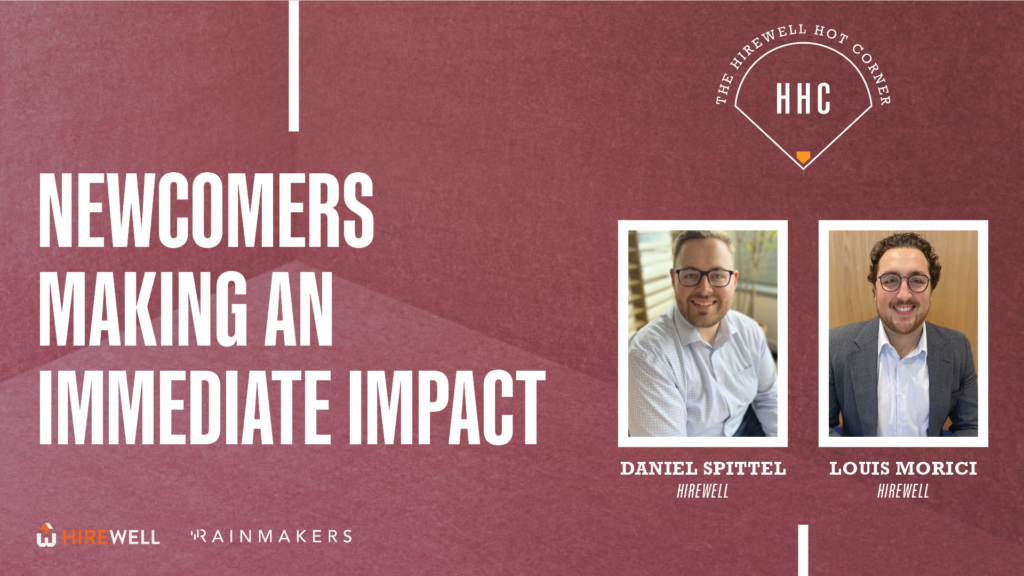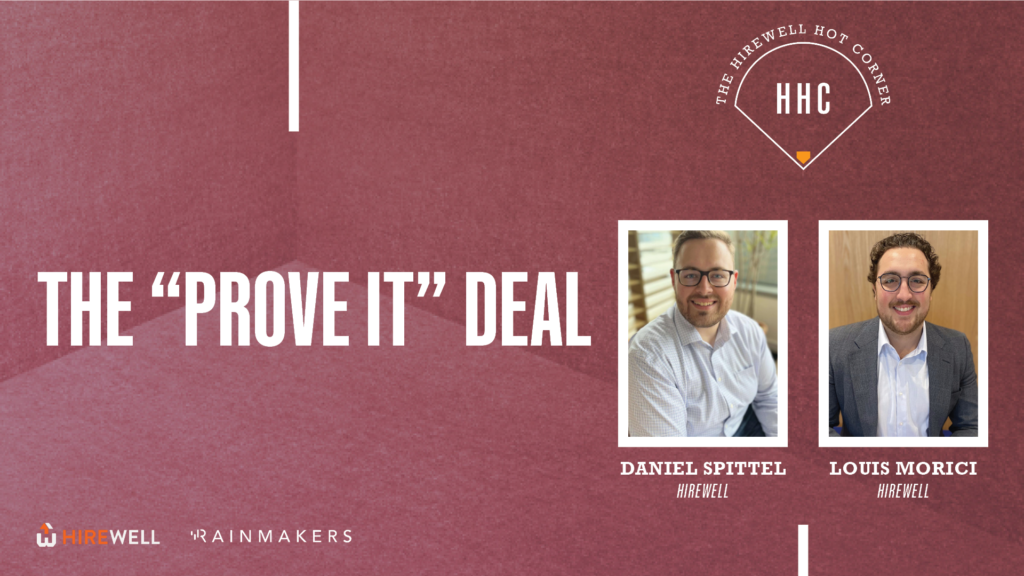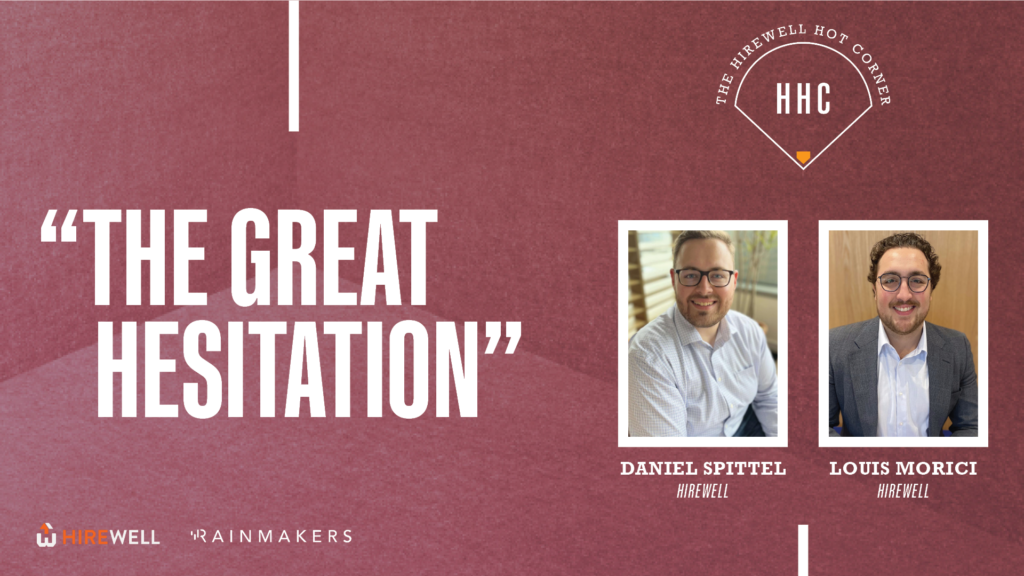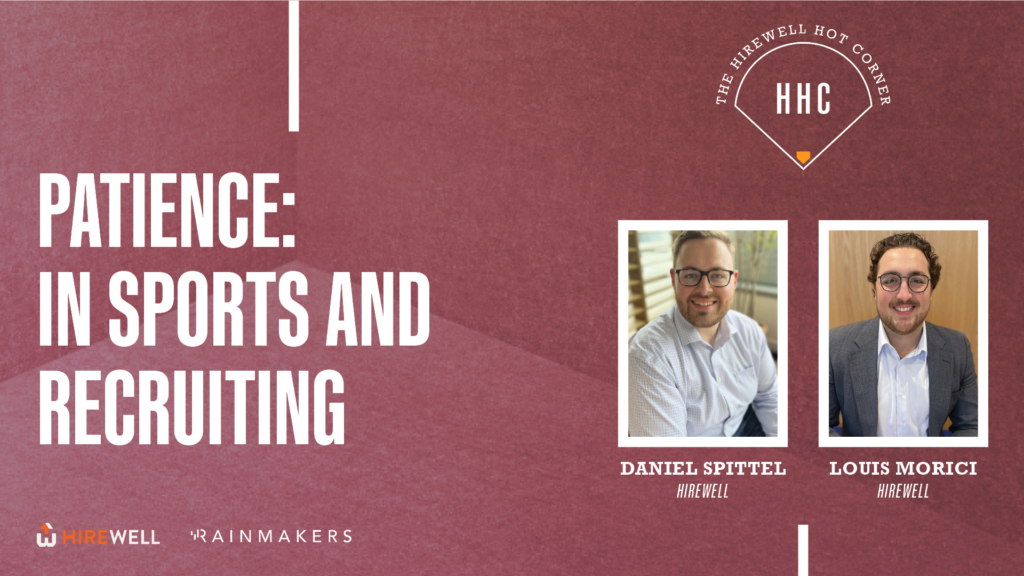In this week’s episode, Dan and Louie discuss the recent NHL Draft Lottery. Louie’s Chicago Blackhawks landed the #1 overall pick and are the grand prize winners of the Connor Bedard Sweepstakes. Connor Bedard is the #1 prospect in the world and we segway that by discussing pivotal hiring. Hiring for a role that targets someone who will act as a catalyst for the rest of the organization. We dive into how to identify that role and how that type of hire can cause a ripple effect.
Episode Transcript
Welcome back to the Hirewell Hot Corner where sports and recruitment meet. I am your host, Dan Spittel joined as always by my co-host, Louie Morici, the Ironman. Louie, great to see you again. Let’s jump right in. What’s going on in your world, and the world of sports today? Well, as of Monday, I want to say roughly 7:20 PM Central Time.
The Chicago Black Hawks got the number one pick in this coming NHL draft. Yeah, not only is the pool deep, but it comes with arguably the top prospect we’ve seen since Connor McDavid, you know, Sidney Crosby, that type of caliber. Coming from someone who’s reaped the benefits of Sidney Crosby.
Congratulations to you on winning the Connor Bedard lottery. What exactly is Chicago going to get out of this Connor Bedard lottery? Well, we could show you, but he really, what he brings to the table is skill speed, an absolutely phenomenal shot. I mean, it brings Chicago a future in hockey. Like honestly, we lost Kane, we lost Toews this off season, or during the season and you know, both their contracts are up. We moved pieces, you know, we were looking at a five year before we see any sort of something that changed with that lottery ball and that 11 and a half percent that turned into what is the number one pick.
Yeah, you weren’t even supposed to be favored going in to get the number one pick. So luck be ever in favor of the city of Chicago for once. And what else does that potentially do for your franchise now that you have this big marquee player? Well, the rebuild, what looked like, again, five years that timeframe has moved up drastically.
People want to play with this guy. I mean, He’s such a talent, it’s going to attract other folks. I mean, let’s face it, Chicago is a hockey market. It’s an original six franchise. So combining someone of this caliber with the city that is Chicago, it’s a no-brainer for free agents. You know, and then think about it, you’re with a guy that is this good, that can make you better, that’s going to ultimately lead to more money in your next contract.
So there’s so much that goes into it. He’s a literal game changer, franchise changing player. Love to see it. We won three Stanley Cups with Sidney Crosby. So hopefully if you can have even a fraction of that success, it’ll be wild time in Chicago over the next couple years from a hockey fan standpoint.
But let’s do what we do best and let’s talk about recruiting. What does the Connor Bedard in the recruiting world look like right now? Well, it’s really about, is there that pivotal hire? You know, like as a company, you’re going to have to, if things aren’t going your way, if there’s something that is lacking drastically and it’s do or die time, where this next hire, the person that you’ve identified and the role that you identified is being as crucial for the success of the short and long term.
That’s kind of what this is. It’s bring in almost a no-brainer. There’s always uncertainty, but buying in money, whether maybe you overpay in a way. There’s just the importance of this type of hire. Sure. And that pivotal key hire can look like a lot of different things in a lot of different companies.
You know, in your world, you’re in the sales side. That could be a sales manager, oversee a team, maybe bring up their production, bring up their goals. On more of the corporate side, it can be, a C-suite member, it could be a process improvement manager, someone in change management. It can be a number of different areas.
So when we say that Pivotal key hire, we’re not really sticking it in a box here, it’s that it’s up to the company to determine, you know, where they are and where they want to be and what that key hire could be. And so I guess first steps, Louie, what does a company do to say what’s our pivotal key hire? I think it’s really just looking internal.
Are you not generating enough revenue? Why? Obviously that’s more sales. That’s probably a little bit easier to identify. Or if it’s not in that revenue producing type environment, you know, look to the feedback. Like if you’re seeing nothing but constant negative feedback from employees who either work there, still work there, you know.
Maybe it’s bringing on ahead of people, someone who is sole job is to ensure that employees are happy and listening to them and taking internal and changing internal things from benefits to work life balance to, you know, perks. Like there’s so many things that can go into this, but where are the biggest downfalls or shortcomings that your company is experiencing and changing that, rectifying that, how will it impact quickly? What’s the catalyst? Yeah, absolutely. And that’s just looking at it from potentially a negative side. I really want to highlight the on-demand client that I’ve been working with for a good amount of time now. Inecta, they saw a good amount of growth in 2022, client base, employee base, and one of their goals for 2023 was make a couple key hires to align their process, you know, kind of streamline, figure out ways that we can continue to do better and then continue to scale it as they grow.
So very self-aware on their part. Made one of those key hires a couple months ago looking to do, one or two more in the near future. And so that’s been a success on our end and just shows that you can be in a good spot and still have a need for key hires.
It’s just every situation is so different. Yeah, I mean, it’s never easy to look internally and say, Hey, we have an issue here. Like, it’s very hard to actually admit that. But once you’ve done that and digest what it is that this next higher or top higher looks like or what the role is, you’ll start to understand how big of an impact it can have.
You know, look here, there’s that ripple effect. You bring that person in, whatever their task is, or wherever their responsibilities lie, you know the people in that, that fall under them, they’re in a better place. And then those people being in a better place lead to someone in another department, being in a better place like that ripple effect is, it can be tremendous and it can really take your company from point A to the next level of point B.
It’s not just a lateral move. Absolutely. And it’s always so difficult to kind of forecast what the future holds and predict what’s going to happen when you make this hire or these series of events. But there’s a reason there’s goals in place as a company, within teams.
And if you have done the homework, I know a lot of our last episode was about research and pre-work. If you’ve taken the time to identify shortcomings, identify opportunities, and identify that ideal candidate, the experience they possess, the background they have to get you to those next steps. You can see and you can kind of map out 6, 12, 18 months what it’s going to look like for that department, for that team, for an individual, for that single person, and really for the company as a whole.
So ripple effect is a great way to describe it because. While on paper, it looks like one hire and it’s a bigger hire. That’s why it’s a key person, but it can really just keep rippling out for departments, for teams, for years to come. Yeah. There’s no limitation to the effect.
You know, when you bring in someone of that nature, someone who’s looked at to be a leader, to be a game changer, to be a counter Bedard, you know. That everyone falls in line after, and it’s building a culture. It’s building an environment where people love to be. People want to produce, people take ownership of what they’re doing, their role for that company.
Sure. And you know, you can, again, you can do your best to kind of forecast what you think you need and what you think you’re going to get out of this role, but as I’m sure you’ve seen a lot in working with a number of our clients, and I’ve seen as well in my recruiting experiences, when you find that right person, that X factor, that role, the company just continues to evolve, grow, and develop in avenues you didn’t even think were possible at the time.
Whether it be expanding various product offerings, if that’s the type of service company that you offer. If rolling out new programs for internal employees, rolling out new programs for clients, customers, you just never know what you’re going to get.
And it all comes back to, you know, putting in the work and doing your best to identify that candidate. But it’s not just experience. And I know you and I have talked about this one extensively. It’s not just what’s on a resume. There’s charisma that comes from a candidate. There’s just their ability to work with others and just be a people person and feel trustworthy.
There’s so much that goes into it that you can’t just write on a resume. And you know, that’s why some of these types of hires that are pivotal for companies to maybe ride the tide or whatever the saying is, it goes beyond what they can do because there’s probably a hundred people that on paper meet what they’re looking for, but are they someone that can inspire people, and that is very, very difficult.
It’s unteachable, it’s those intangibles. The makings of a great captain, a great quarterback. X coach, whatever sport reference we want to put in there, they all possess it. Well, what can companies do to set themselves up for best chance of finding the success with this hire? Define what they’re looking for and when they do that, have that pathway to their idea of what success would look like in that role.
Now I know that you could pretty much do that for any role. You know, which is very helpful, but it’s being self-aware to the point where you really nitpick where you’re falling short and tell those potential candidates, this is where we’re missing the mark. And let those candidates kind of tell you how they would help.
I think that that would be, from a very high end, how I would approach that. Absolutely you have an idea of what you’re looking for. You have an idea of what you need to get to that next step. So you’re trying to match up the experience that people possess in order to do so. It really just comes back to, in my end, looking past just the experience.
You know, there’s a reason that we go through these interview processes, multiple interviews with multiple people, asking questions about culture, company fit, whatnot. That’ll matter more in the end than the experience on their resume, the personality, the fit, their drive, what motivates them. And that biggest thing for me is take that into consideration very highly when you make that pick for your pivotal key hire. A thousand percent.
I could not have said it any better, you know, it’s very much about the person compared to just the experience, because I think experience is great, but you’re looking for that diamond in the rough, essentially like any higher, but again, like this is higher stakes because this could make or break a company.
Absolutely. All right, Louie, two minute drill. Take us home. What do you think the Black Hawk season’s going to look like and what’s your hope for Connor Bedard’s career? So Stanley Cup, Calder Trophy, which is rookie of the year. MVP, Hart trophy. Yeah, he’s winning everything. Yes. Call that over exaggerating. Maybe it is.
But in realistic terms, I’m looking for this kid to just hit the ground running, make everyone around him better. And one thing I saw from the Black Hawks this year is Luke* Richardson, he made this environment, he’s the coach, that there’s this never give up mentality.
Like even towards the last week, like there was games that we probably shouldn’t have won. Like we didn’t need to win to get Bedard, but we still did because the culture, the attitude. So I think getting a guy who has these abilities in that type of environment, there’s your catalyst, there’s your top hire.
There you go. This is your victory lap. So I’ll leave the two minute drill to you this time. On behalf of Louie and myself, thank you all once again for tuning into the Hirewell Hot Corner. Please do join us again in two weeks for our next episode. And as always, stay classy LinkedIn. Go Hawks.


















